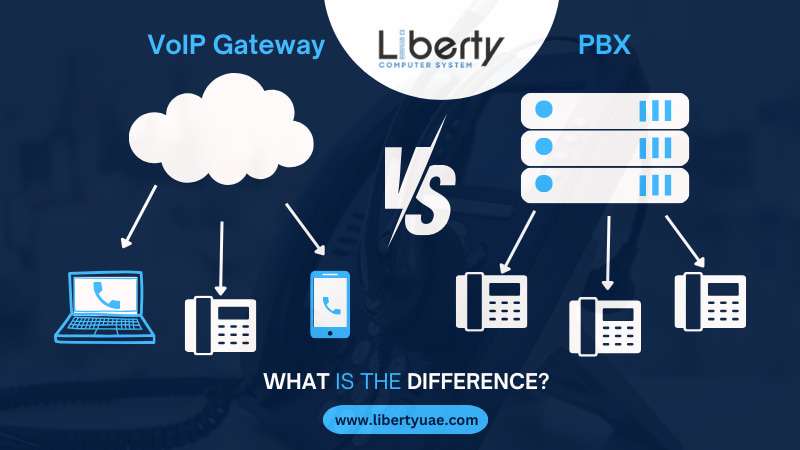In the ever-evolving landscape of business communications, two vital components often come into play: VoIP gateway vs. PBX (Private Branch Exchange) systems. These elements are crucial for the functionality of your IP PBX System in Dubai, enabling efficient and feature-rich communication.
In this article, we’ll explore the key distinctions between VoIP gateways and PBX systems, shedding light on their roles and how they contribute to the seamless operation of your business communication network.
Understanding VoIP Gateways:
A VoIP (Voice over Internet Protocol) gateway is a device or software application that facilitates the conversion of traditional analog or digital voice signals into digital data packets, which can be transmitted over the Internet. VoIP gateways act as intermediaries between the analog or digital telephony network and the IP network.
Here’s A breakdown Of The Essential Aspects Of VoIP Gateways:
1. Signal Conversion – VoIP gateways are responsible for transforming analog voice signals from traditional landline phones or digital signals from digital phones into digital data packets. This conversion process is necessary for transmitting voice over IP networks.
2. Compatibility – VoIP gateways ensure compatibility between different types of communication networks. They enable seamless communication between IP-based VoIP networks and traditional PSTN (Public Switched Telephone Network) or ISDN (Integrated Services Digital Network) networks.
3. Bridging Networks – VoIP gateways bridge the gap between the analog or digital telephony world and the IP-based communication world. They serve as the interface that allows communication to occur between these two distinct networks.
4. VoIP-to-VoIP Communication – VoIP gateways can also facilitate VoIP-to-VoIP communication, where they help route calls between different VoIP networks or platforms.
Understanding PBX Systems:

A PBX (Private Branch Exchange) system is a centralized communication system used within organizations to manage and route calls efficiently. It serves as a private telephone network, allowing internal and external calls to be directed to the appropriate extensions or lines. PBX systems offer various features and functionalities that enhance communication within an organization.
Here’s A Closer Look At PBX Systems:
1. Call Routing – PBX systems are responsible for routing incoming and outgoing calls to the intended recipients within an organization. They use automated call distribution and interactive voice response (IVR) systems to ensure that calls reach the right destination.
2. Extension Management – PBX systems provide the ability to create and manage internal extensions for employees. Each extension can have its unique phone number, allowing for internal calls without going through the public telephone network.
3. Call Transfer and Conferencing – PBX systems enable call transfer features, allowing calls to be transferred from one extension to another. They also facilitate conference calling, making it easy for multiple parties to participate in a single call.
4. Voicemail and Messaging – PBX systems often include voicemail and messaging features, allowing callers to leave messages for recipients who are unavailable to answer the phone. These messages can be retrieved later.
5. Call Monitoring and Analytics – Many modern PBX systems offer call monitoring and analytics tools that allow organizations to track call volumes, call durations, and other call-related data. This information can be valuable for optimizing communication processes.
Key Differences Between VoIP Gateways And PBX Systems:
1. Functionality
- VoIP Gateways – Primarily focus on the conversion of voice signals between different network types, enabling communication between analog or digital phones and VoIP networks.
- PBX Systems – Serve as comprehensive communication systems within organizations, managing call routing, extensions, voicemail, and various features.
2. Scope Of Use
- VoIP Gateways – Primarily used to bridge traditional telephony networks with VoIP networks or to facilitate VoIP-to-VoIP communication.
- PBX Systems – Designed to provide advanced communication capabilities within an organization, handling internal and external calls.
3. Features
- VoIP Gateways – Primarily focus on signal conversion and may not offer the extensive feature set found in PBX systems.
- PBX Systems – Include a wide range of features, such as call routing, extensions, voicemail, conferencing, and call monitoring, to enhance internal and external communication.
4. Deployment
- VoIP Gateways – Typically deployed at the network’s edge to facilitate the connection between different types of networks.
- PBX Systems – Installed within an organization’s premises or hosted in the cloud, serving as the central communication system.
Choosing The Right Solution For Your IP PBX System In Dubai:
When deciding whether to implement a VoIP gateway or a PBX system for your IP PBX system in Dubai, consider the following factors:
- Communication Needs – Assess your organization’s communication requirements, including the volume of calls, the need for advanced features, and the types of devices in use.
- Compatibility – Determine whether your existing communication infrastructure includes traditional telephony networks that require VoIP gateways for integration.
- Budget – Evaluate your budget constraints, as PBX systems typically offer more features but may require a larger investment.
- Scalability – Consider the scalability of the solution to accommodate future growth and changes in communication needs.
- Integration – Ensure that the chosen solution integrates seamlessly with other communication tools and applications used within your organization.
Conclusion
Both VoIP gateways and PBX systems play essential roles in the functioning of an IP PBX system in Dubai. VoIP gateways facilitate signal conversion and network bridging, while PBX systems provide comprehensive call management and advanced communication features.
The choice between these two solutions should align with your organization’s specific communication requirements, infrastructure, and budget considerations, ultimately enhancing your business’s communication capabilities in the vibrant business environment of Dubai.




.png)


